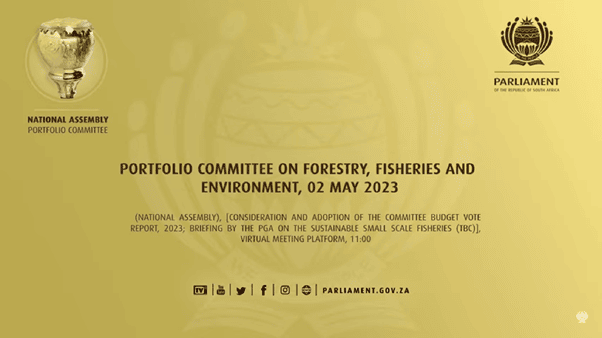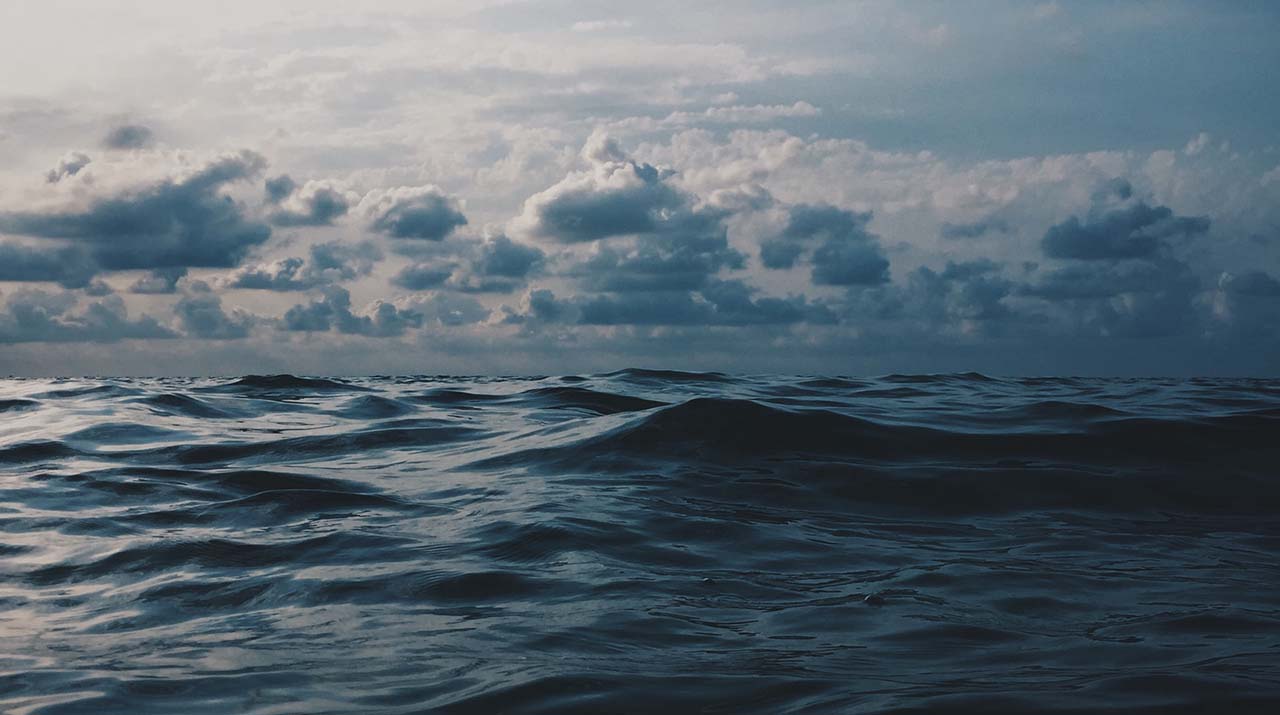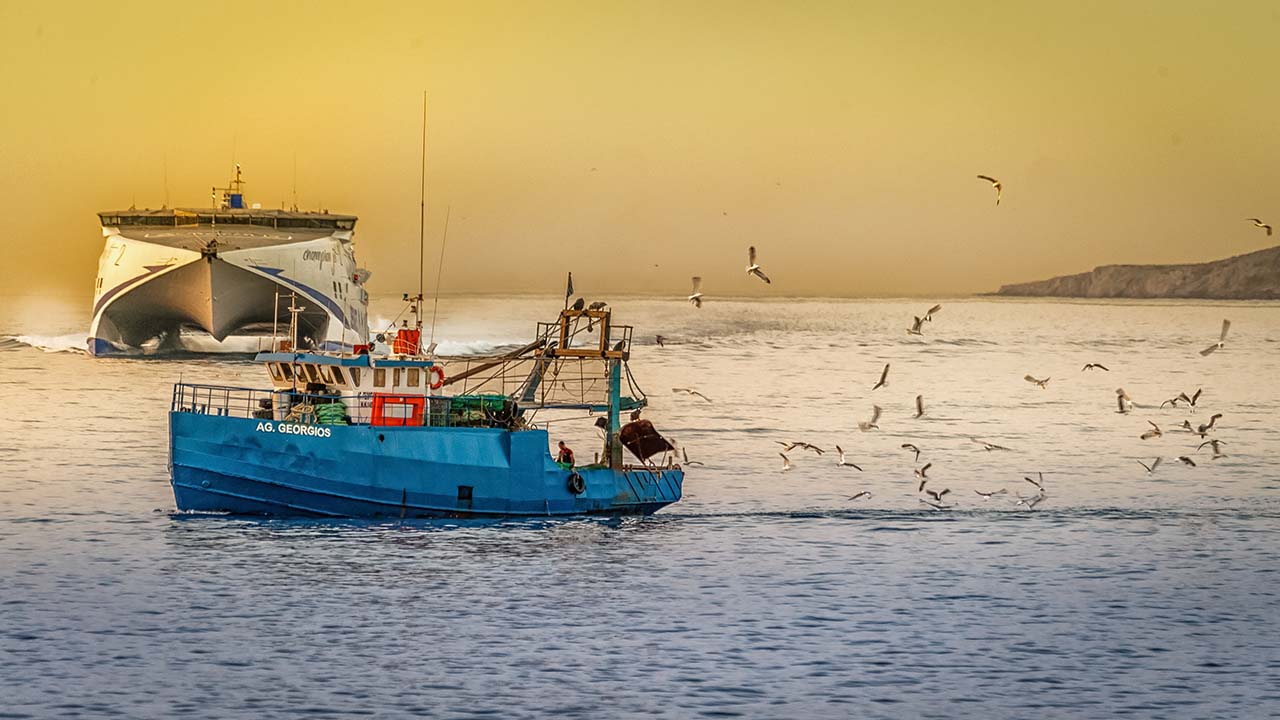

On 2nd May and 10th May 2023, in collaboration with the Environmental Law Institute (ELI), PGA convened two virtual briefings of the Portfolio Committee on Forestry, Fisheries, and the Environment of the National Assembly of South Africa. These Roundtable Discussions on Building Resilience in Small-Scale Fishing Communities in South Africa, informed by expert presentations and local insights, sought to identify specific next steps that lawmakers may take to improve the livelihoods of their coastal constituents and in particular women working in the fisheries sector. These meetings served as the 3rd and 4th Sessions on the topic, continuing the discussion from the previous Sessions for the Portfolio Committee held on June 2022 and March 2020.
Chairing the meeting, Hon. Philip Modise, Chair of the Portfolio Committee on Forestry, Fisheries and the Environment, emphasized the important role of the Portfolio Committee in overseeing and providing support to small fishing communities as they play a vital part in sustaining local economies and preserving cultural heritage.
Highlighting the importance of effective management in small-scale fisheries, Ms. Wilmien Wicomb, Co-Lead of the Land Program of the Legal Resources Center, noted the importance of ensuring co-management mechanisms reflect the needs of these communities and that decision-making processes highlight economic empowerment of small-scale fishers, including indigenous fishers. Prof. Moenieba Isaacs, Institute for Poverty, Land and Agrarian Studies, School of Government Faculty of Economic and Management Sciences University of the Western Cape, noted the importance of recognizing the role of women in fisheries through effective access to participation in decision-making processes.
Hon. Thembeka Mchunu emphasized the importance of empowering women in fisheries in South Africa, calling on Portfolio Committee Members to explore concrete solutions to address existing gender inequalities.
Reflecting on specialists remarks Hon. Nazier Paulsen, underscored the importance of building capacity by providing fishers with sustainable training, technical assistance, and management skills, and urged the Portfolio Committee to focus on reviving coastal communities that have become increasingly vacant.
At the close of the 3rd Roundtable Discussion Session, Members of the Portfolio Committee highlighted the need to deepen the discussion and agreed to continue to identify next steps to increase sustainability of small-scale fisheries informed by experts in a 4th Roundtable Discussion.
During the 4th Roundtable Discussion on May 10th, parliamentarians continued to discuss needs of small-scale fishing communities and the opportunities to increase effectiveness of co-management mechanisms, strengthen the historical rights of indigenous peoples, ensure economic and food security, and to bolster women’s economic empowerment.
PGA Secretary-General Ms. Mónica Adame offered introductory remarks, underlining the important role of parliamentarians in achieving the Sustainable Development Goals from a Human-Rights perspective in fisheries.
Ms. Sofia O’Connor, Interim Director, Ocean Program, Environmental Law Institute reinforced the need to focus on tools and management approaches that are based on local priorities, providing the example of exclusive zones for fishers as a vital ocean management tool. Ms. O’Connor highlighted the technical support and resources provided by PGA and ELI within the scope of the PGA Oceans Campaign Project to Increase the Sustainability of Small-Scale Fisheries, of particular relevance, the Law and Governance Toolkit for Sustainable Small-Scale Fisheries, jointly published in 2020 by ELI and PGA.
Prof. Merle Snowman, Department of Environmental and Geographical Science of the University of Cape Town, reiterated the need for accessible consultations with coastal communities, noting the importance of access to participation in decision-making processes for marine resources management mechanisms, including the creation of Marine Protected Areas. Prof. Snowman shared recorded testimonies from two fisherwomen leaders, Ms. Hilda Adams and Ms. Melissa Pullen, which noted the urgent need to ensure women in fisheries have efficient support mechanisms in place to access small-scale fishing processes.
Highlighting other intersecting human rights areas within small-scale fisheries, Ms. Yvette le Fleur, Junior Researcher and Information Officer, Masifundise Development Trust, underscored the vital role of small-scale fisheries in food security, sustainable development, gender equality and inclusion.
During the discussion, Hon. Hannah Winkler recalled the impacts of depleting marine resources on small scale fishing communities that rely on fishing to subsist. Hon. Winkler mentioned the difficulties in balancing industrial fishing and the rights of local fishing communities with marine resource allocation, calling on fellow parliamentarians to address need to provide alternative means of subsistence for fishers facing scarcity of marine resources.
Hon. Simphiwe Mbatha noted the need to explore approaches to increase efficiency of co-management mechanisms, recognizing the value of continued support from PGA and specialist insights to best assist small-scale fishing communities build resilience.
Closing these 3rd and 4th Roundtable Discussions, Members of the Portfolio Committee affirmed their commitment to continue efforts in support of small-scale fishing communities in South Africa. The in-depth engagement demonstrated by the participants reflected their renewed commitment towards:
- Increasing women empowerment, including economic, in small-scale fisheries;
- Ensuring traditional fishers’ rights while addressing sustainability of marine resources;
- Establishing strategies that recognize the importance of local communities-based fisheries management;
- A human rights-based approach to building resilience in small-scale fisheries, ensuring sustainable food security for coastal communities.



